Sam Ouliaris and Peter C.B. Phillips
The following product, available for free download, is developed by Sam Ouliaris and Peter C.B. Phillips, third party developers, for use with GAUSS.
COINT 2.1 - Co-Integrated Systems (Free!)
A suite of econometric software for GAUSS users with a special focus on nonstationary time series, unit roots, cointegration and modern model selection methods for economists, econometricians, statisticians, engineers, forecasters and other users of time series methods.
Whether you are an economist doing empirical time series research, an econometrician in a forecasting unit, a professor teaching econometrics or a graduate student of economics or statistics, you need access to the latest regression methods for stationary and nonstationary time series.
COINT gives GAUSS users a huge library of scientific procedures for time series regression and model selection. Included are the latest techniques for unit root testing, cointegrating regression estimation, ARMA and VAR modeling with some unit roots, GMM and GIVE estimation with nonstationary data, and Bayesian as well as classical statistical methods for detecting unit roots and cointegration in economic time series.
COINT will enhance your research and teaching by giving you access to state-of-the-art times series methods and econometric techniques. Be more productive in GAUSS, work with the latest nonstationary regression methods and give presentations that utilize the latest features of GAUSS publication quality graphics.
Platforms: Windows, Mac and Linux.
Requirements: GAUSS version 3.2 and above.
Contact:Sam Ouliaris
Peter C.B. Phillips

